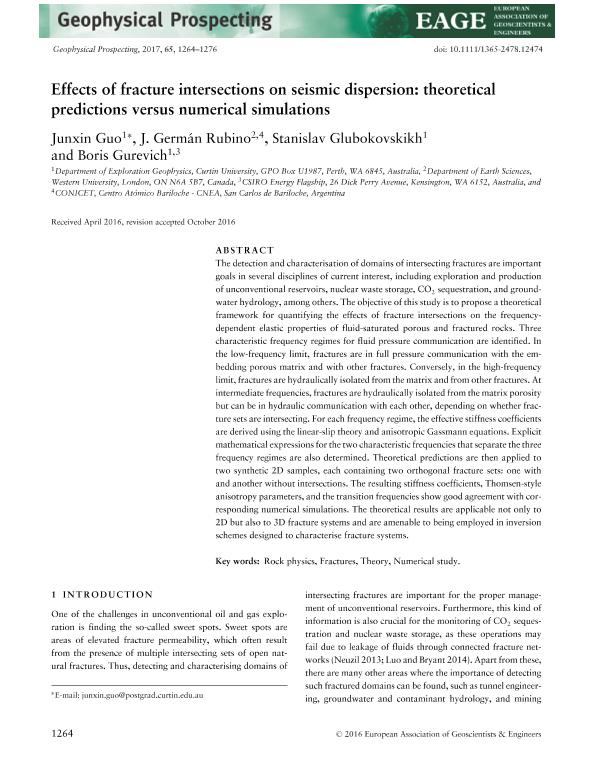Mostrar el registro sencillo del ítem
dc.contributor.author
Guo, Junxin
dc.contributor.author
Rubino, Jorge German

dc.contributor.author
Glubokovskikh, Stanislav
dc.contributor.author
Gurevich, Boris
dc.date.available
2019-03-15T18:00:34Z
dc.date.issued
2017-09
dc.identifier.citation
Guo, Junxin; Rubino, Jorge German; Glubokovskikh, Stanislav; Gurevich, Boris; Effects of fracture intersections on seismic dispersion: theoretical predictions versus numerical simulations; Wiley Blackwell Publishing, Inc; Geophysical Prospecting; 65; 5; 9-2017; 1264-1276
dc.identifier.issn
0016-8025
dc.identifier.uri
http://hdl.handle.net/11336/71769
dc.description.abstract
The detection and characterisation of domains of intersecting fractures are important goals in several disciplines of current interest, including exploration and production of unconventional reservoirs, nuclear waste storage, CO2 sequestration, and groundwater hydrology, among others. The objective of this study is to propose a theoretical framework for quantifying the effects of fracture intersections on the frequency-dependent elastic properties of fluid-saturated porous and fractured rocks. Three characteristic frequency regimes for fluid pressure communication are identified. In the low-frequency limit, fractures are in full pressure communication with the embedding porous matrix and with other fractures. Conversely, in the high-frequency limit, fractures are hydraulically isolated from the matrix and from other fractures. At intermediate frequencies, fractures are hydraulically isolated from the matrix porosity but can be in hydraulic communication with each other, depending on whether fracture sets are intersecting. For each frequency regime, the effective stiffness coefficients are derived using the linear-slip theory and anisotropic Gassmann equations. Explicit mathematical expressions for the two characteristic frequencies that separate the three frequency regimes are also determined. Theoretical predictions are then applied to two synthetic 2D samples, each containing two orthogonal fracture sets: one with and another without intersections. The resulting stiffness coefficients, Thomsen-style anisotropy parameters, and the transition frequencies show good agreement with corresponding numerical simulations. The theoretical results are applicable not only to 2D but also to 3D fracture systems and are amenable to being employed in inversion schemes designed to characterise fracture systems.
dc.format
application/pdf
dc.language.iso
eng
dc.publisher
Wiley Blackwell Publishing, Inc

dc.rights
info:eu-repo/semantics/openAccess
dc.rights.uri
https://creativecommons.org/licenses/by-nc-sa/2.5/ar/
dc.subject
Fractures
dc.subject
Numerical Study
dc.subject
Rock Physics
dc.subject
Theory
dc.subject.classification
Meteorología y Ciencias Atmosféricas

dc.subject.classification
Ciencias de la Tierra y relacionadas con el Medio Ambiente

dc.subject.classification
CIENCIAS NATURALES Y EXACTAS

dc.title
Effects of fracture intersections on seismic dispersion: theoretical predictions versus numerical simulations
dc.type
info:eu-repo/semantics/article
dc.type
info:ar-repo/semantics/artículo
dc.type
info:eu-repo/semantics/publishedVersion
dc.date.updated
2019-03-08T16:34:29Z
dc.journal.volume
65
dc.journal.number
5
dc.journal.pagination
1264-1276
dc.journal.pais
Reino Unido

dc.journal.ciudad
Londres
dc.description.fil
Fil: Guo, Junxin. Curtin University; Australia
dc.description.fil
Fil: Rubino, Jorge German. Consejo Nacional de Investigaciones Científicas y Técnicas; Argentina. Comisión Nacional de Energía Atómica. Centro Atómico Bariloche; Argentina. Western University; Canadá
dc.description.fil
Fil: Glubokovskikh, Stanislav. Curtin University; Australia
dc.description.fil
Fil: Gurevich, Boris. Curtin University; Australia. Csiro Energy Flagship; Australia
dc.journal.title
Geophysical Prospecting

dc.relation.alternativeid
info:eu-repo/semantics/altIdentifier/doi/https://dx.doi.org/10.1111/1365-2478.12474
dc.relation.alternativeid
info:eu-repo/semantics/altIdentifier/url/https://onlinelibrary.wiley.com/doi/abs/10.1111/1365-2478.12474
Archivos asociados
